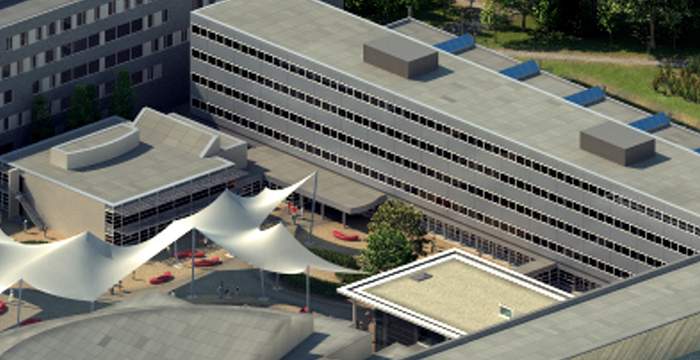Gjerrit Meinsma was born in 1965 in Opeinde, a little village in the northern part of The Netherlands. There he attended the nursery school ``De Kindertuin'' and elementary school. In the off-school hours he spent many hours making and throwing boomerangs at and with his friends, and in the weekends he used to play korfball. From the age of 12 till the age of 18 he attended the grammar-school ``Het Drachtster Lyceum'' in the nearby town Drachten. Somewhere in the middle of this period the fascinating world of music caught his attention. Listening to music and playing the piano have been his major hobbies since. At the same time Gjerrit developed a keen interest in mathematics, and he decided to pursue his career in this direction. In 1983 he went to Enschede to study applied mathematics at the University of Twente. At the end of 1988 he finished his master's thesis entitled ``Chebyshev approximation by free knot splines'' and in March 1989 he received his master's degree. After a break of five weeks he returned to the faculty he graduated with, only this time as a research assistant (AiO) with the Systems and Control Group. Half a year later he bought himself a brand new Klug & Sperl upright piano, and a few years later, in 1993, he finished his thesis on H-infinity control. Not long thereafter he dumped his winter coat in the garbage bin and left for sunny Australia were he worked as a post-doc for three years with the Electrical Engineering Department at the University of Newcastle. In January 1997 he returned to Enschede to take up a two-year post-doc position with his former group. He quickly acquired a much needed winter coat. Since 1999 he holds a permanent position at this group.
Gjerrit likes all sorts of music, but he is fanatic only about classical music. His favorite composers are Bach, Beethoven, Schubert, Chopin, Grieg, Ravel, Skriabin and Janacek. He is a fan of the pianist Sviatoslav Richter, and also likes very much Sofronitsky, Lipatti, Rubinstein, Oborin and Henkemans and many others.
Expertise
Computer Science
- Vectors
- Reconstruction Problem
- Correlation
Medicine and Dentistry
- Inpatient
- Ventricular Fibrillation
- Patient
- Prognosis
- Resuscitation
Organisations
Publications
2024
2021
Research profiles
Courses academic year 2025/2026
Courses in the current academic year are added at the moment they are finalised in the Osiris system. Therefore it is possible that the list is not yet complete for the whole academic year.
- 191508209 - Internship AM
- 191508309 - Final Project (combination)
- 191508409 - Final Project M-AM
- 191560671 - Robust Control
- 191561620 - Optimal Control
- 193810010 - Biological Control Systems
- 200900030 - Master Research SE Mathematics
- 202001281 - Signals with Information
- 202001343 - Signals and Transforms
- 202001344 - Probability Theory for AM
- 202200120 - Internship ROB
- 202200141 - Linear Structures 1
- 202200142 - Modelling and Programming 1
- 202200238 - Systems Theory
- 202200239 - Modelling and Programming 2
- 202200249 - Python Programming AM 1
- 202300130 - Capita Selecta Applied Mathematics
- 202300156 - Modelling 2 - AM/TCS
- 202300196 - Modelling 2 and Project for AM-TN
- 202300349 - Internship ROB / ME
- 202400274 - Signals and Systems
- 202400669 - Capita Selecta Applied Mathematics 2
- 202500385 - Internship ROB / AM
- 202500460 - Analysis 1
- 202500521 - Internship AM / CS 30 EC
- 202500526 - Internship AM / CS
Courses academic year 2024/2025
- 191508209 - Internship AM
- 191508309 - Final Project (combination)
- 191508409 - Final Project M-AM
- 191560671 - Robust Control
- 191561620 - Optimal Control
- 193810010 - Biological Control Systems
- 202001211 - Linear Algebra for TN
- 202001281 - Signals with Information
- 202001343 - Signals and Transforms
- 202001344 - Probability Theory for AM
- 202001350 - Analysis II
- 202001379 - Bachelor's Assignment
- 202200120 - Internship ROB
- 202200141 - Linear Structures 1
- 202200142 - Modelling and Programming 1
- 202200143 - Analysis 1
- 202200238 - Systems Theory
- 202200239 - Modelling and Programming 2
- 202200249 - Python Programming AM 1
- 202300130 - Capita Selecta Applied Mathematics
- 202300156 - Modelling 2 - AM/TCS
- 202300196 - Modelling 2 and Project for AM-TN
- 202300349 - Internship ROB / ME
- 202400274 - Signals and Systems
- 202400669 - Capita Selecta Applied Mathematics 2
Arjan van der Schaft and I wrote a book called
A Course on Optimal Control
It is published in 2024 as part of the series Springer undergraduate texts in mathematics and technology, see Springer. Unavoidably, there will be typos and errors in the book. On this website we keep track of the errors, and we will upload other useful material such as slides and additional examples et cetera.
Errata:
- PAGE 254: the final sentence of the solution of 3.3(c) "(One can show... below.)" is wrong. It should be removed. In fact, V(x,t):=2x is a lower bound of the value function.
- PAGE 243: the caption of Fig. B.15 says "See Exercise B.7". This should have been "See Exercise B.24".
- PAGE 250, solution 2.11: the ce^t/c should be (e^t)/c.
Supplementary material:
- Slides: https://www.utwente.nl/en/eemcs/sacs/teaching/media/ocslides2025.pdf
- If you want to cover infinite horizon LQ but do not want to do the finite horizon case, then you might want an alternative version of Section 4.5. It deals with infinite horizon LQ and does not require any preknowledge: ACourseOnOptimalControl-sec4p5.pdf
Address

University of Twente
Zilverling (building no. 11), room 3015
Hallenweg 19
7522 NH Enschede
Netherlands
University of Twente
Zilverling 3015
P.O. Box 217
7500 AE Enschede
Netherlands